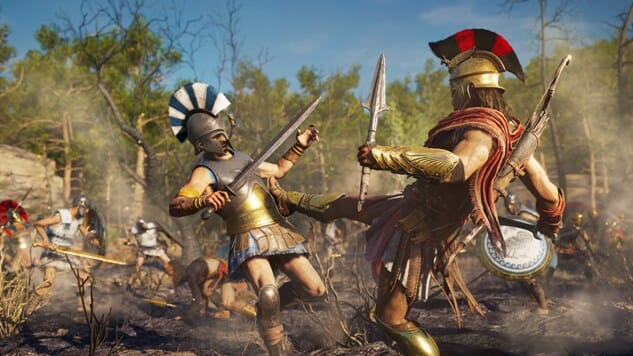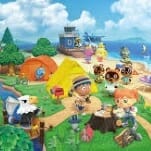8 Basic Tips for Assassin’s Creed Odyssey

A new year brings a new Assassin’s Creed, and this year’s adventure, Assassin’s Creed Odyssey, sees another round of updates and new features added to the basic foundation. Odyssey builds off of last year’s Egyptian-set Origins, using the same revised combat mechanics and RPG systems and adding some new elements that you’ll have to get used to. A full walkthrough would run for tens of thousands of words—this is a long game—but we can offer up a few basic tips based on our experience with Odyssey to get you started. It might be easy to get overwhelmed by a game this big and long, but these pointers should help keep you moving in the right direction.
Don’t Be Afraid to Explore
At the very start of Odyssey you’re presented with a huge decision between Guided Mode and Exploration Mode. Exploration Mode removes many of the on-screen markers and icons that tend to clutter the screen in these games. It also makes it vital to actually explore the Greek countryside. From old ruins to abandoned temples to hidden bandit camps, there’s a lot to discover, and almost all of it will give you experience points, money and more. Exploring is also a great way to find the materials you’ll need to upgrade your arms, through foraging and hunting. It pays to stray far from the roads and settlements in this game, more than ever before in an Assassin’s Creed.
Upgrade Weapons and Armor
The RPG nature of the game leads to some awkwardness with how weapons and armor are valued. You can have a Legendary weapon that’s less powerful than a common one that’s just one or two levels higher, or a full suit of Legendary armor that can’t match the strength of piecemeal scraps randomly picked up throughout the game. Fortunately every weapon and piece of armor can be upgraded by the blacksmiths found in major towns. Upgrades boost an item to whatever level you’re currently ad, increasing its stats accordingly. If you have a Legendary weapon that’s level 6, and thus far less powerful than a common weapon at level 9, the Legendary weapon should be upgraded to level 9 too; at that point it’ll be far more powerful than the common weapon. It can take a lot of materials to upgrade something—and the bigger the gap between the item’s level and yours, the more materials it’ll take—but it’s absolutely worth keeping your best items as close to your level as possible.
Make a Point of Collecting Materials
Again, materials like soft leather, olive wood, precious gems and others are crucial to keeping your best armor and weapons in their best shape. There are six different kinds of crafting materials, and there are different ways to find all of them. You’ll often find some in chests, in war supplies, and when looting the bodies of dead soldiers. Blacksmiths will also often sell them, although the prices usually aren’t great. Soft leather can also be found by hunting animals, and olive wood grows naturally throughout the forest. Iron metal is often found in deposits in caves, and precious gems can be acquired by taking on bounty quests or also sometimes in caves. Obsidian glass is often found in unique chests and on the bodies of dead leaders, and ancient tablets are occasionally found in the historical ruins you’ll often come across. All of them are vital, and you should always take them any of them whenever you find them.
Another Way to Get Materials: Dismantle Unneeded Items Instead of Selling Them
Drachmae is much easier to come by than crafting materials. When you have weapons and armor that you don’t need any more, instead of selling them you should dismantle them to recoup some materials. It’s faster than traipsing around the woods looking for animals to kill, and also saves you the guilt of, you know, killing animals. Pretty much all common weapons and armor should be dismantled, as there’ll be no shortage or rare or epic items around Greece. And once you get Legendary gear, you should be upgrading it regularly, anyway. You might feel inclined to sell these less valuable items in bulk, but don’t—it’s best to recycle them for their materials.
-

-

-

-

-

-

-

-

-

-

-

-

-

-

-

-

-

-

-

-

-

-

-

-

-

-

-

-

-

-

-

-

-

-

-

-

-

-

-

-








































